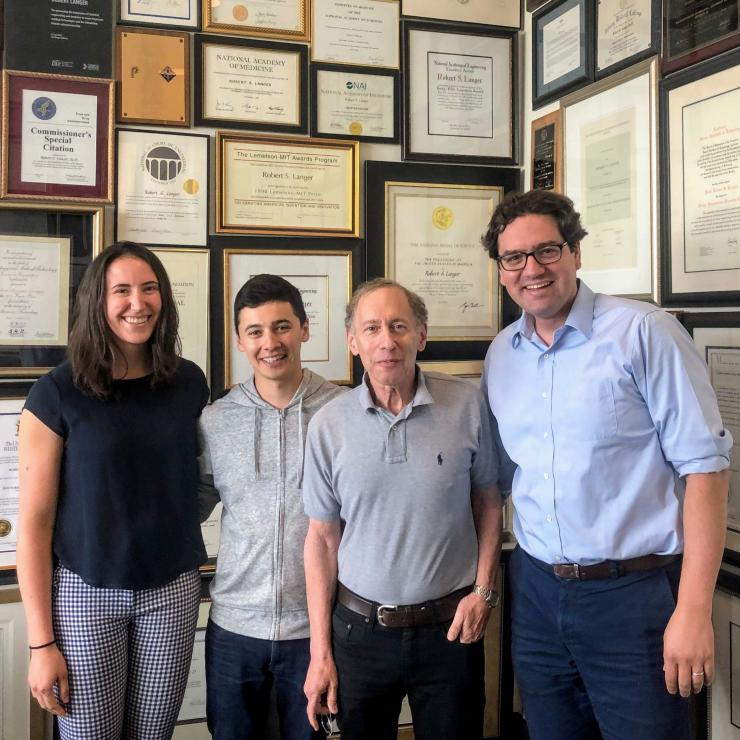
For the Translational Research Institute of Space Health, solving the human health challenges of deep space exploration requires novel approaches and promising therapeutics.
A successful journey to deep space and Mars present many challenges that must be overcome: harmful radiation, long-term exposure to a microgravity environment, minimal access to healthcare equipment and supplies, isolation and confinement, and more. Healthcare in space takes place in a hostile environment entirely unlike doctors’ offices and hospitals on earth.
To uncover solutions to these problems, TRISH supports research into novel yet promising health technologies and new approaches to drug delivery. One avenue of research that TRISH is supporting is microbial therapeutics. This rapidly developing field is focused on using bacteria or other microorganisms to treat diseases. TRISH has funded a team at the Massachusetts Institute of Technology led by National Medal of Science recipient Prof. Robert Langer and his collaborator Prof. Giovanni Traverso, with work carried out by postdoctoral associate Dr. Miguel Jimenez and technical associate Johanna L’Heureux.
The team is exploring ways to improve microbial therapies that reveal opportunities for caring for astronaut health in space, and the TRISH-supported investigation was published in the Journal of Experimental Medicine.
Microbe Therapy for Deep Space
Microbial therapies can work in a few different ways. First, in their natural ecosystem, beneficial microbes can compete with pathogenic microbes to prevent disease and modulate the immune system. Alternatively, microbes can be engineered to scavenge toxins or produce needed compounds or therapeutics.
There are microbial therapeutics in all stages of development for terrestrial healthcare. Engineered microbes that can remove toxins, express proteins, or modulate the immune system are being tested for treatment of a wide range of diseases and conditions such as diabetes, cancer, obesity, asthma, and autism.
TRISH funded the MIT team to dig deeper into microbial therapies for space applications. The team is developing microbe formulations that have long-term stability as well as a device that can administer them to the gastrointestinal system. This work will address critical delivery challenges for microbes, particularly in space travel where microbes may have to be stored at less than optimal conditions for long periods of time and where equipment and healthcare specialists that would be used in a traditional healthcare setting are not available.
Benefits of Good Bacteria
Microbial therapeutics hold several advantages over traditional drug-based therapies. Because they use living organisms that can reproduce, microbial therapeutics have the potential for self-renewal and may only need to be administered once. This can reduce costs and trips to a healthcare provider. In the spaceflight setting, limited storage availability and no refrigeration makes these therapies ideal for astronauts.
Another advantage is that the microbes can be genetically engineered to encode an almost endless range of compounds. For example, bacteria can be engineered to express proteins that may be lacking or defective in a certain disease. There are already well-developed tools and techniques for modifying bacterial genetic code; therefore, the engineering process can be rather straightforward and offers scalability.
Finally, microbial therapeutics have the ability to adapt to different environments, which could allow them to respond to different triggers. This feature could be exploited to engineer control of the desired therapeutic under specific circumstances, such as low or high blood sugar, presence of metabolites, and other possibilities.
The unique benefits of using a living microorganism for targeted therapy comes with unique challenges. For example, as the microbes reproduce, there is a possibility that non-patients could be exposed or replication could introduce genetic mutations that lead to unanticipated side effects. This could introduce errors in the therapeutic product and could also “spread” the therapeutic gene beyond the intended patient. Additionally, as living organisms, the microbes produce myriad compounds (carbohydrates, proteins, nucleic acids, etc.), and these could have unintended side effects or host interactions.
The work funded by TRISH is focused on stabilizing microbes that can survive pharmaceutical formulation into a tablet format, endure residence in the stomach, and remain effective through long-duration space flight. So far, the research is showing promise. Their synthetic bacteria have shown ability to remain viable after being crushed, powdered and granulated and reformed into a tablet. Next, the team will integrate these tablets into their delivery device and compare the effects with commercial probiotics.
A Promising Approach for Space Exploration
The team’s research into microbial therapeutics is helping address several of the unique challenges long-duration space travel presents for healthcare. Because of their ability to self-replicate, it may be possible to administer a specific therapeutic to astronauts prior to leaving Earth. This could reduce medical mass and volume requirements and allow terrestrial doctors to ensure the desired effect of the therapeutic before their patient blasts off to Mars and deep space.
Additionally, long-term storage of live microbes is well established, making it possible for microbial therapeutics to be stored on a spacecraft until they may be needed for a specific condition. Because of their self-renewal potential, they may only need to be taken for a limited period of time, which reduces the need to bring months- or years-long supplies of medications that could be needed for chronic conditions.
TRISH is exploring new frontiers in astronaut health. Advancing knowledge of microbial therapies brings us one step closer to solving the challenges of long-duration and deep space travel.








